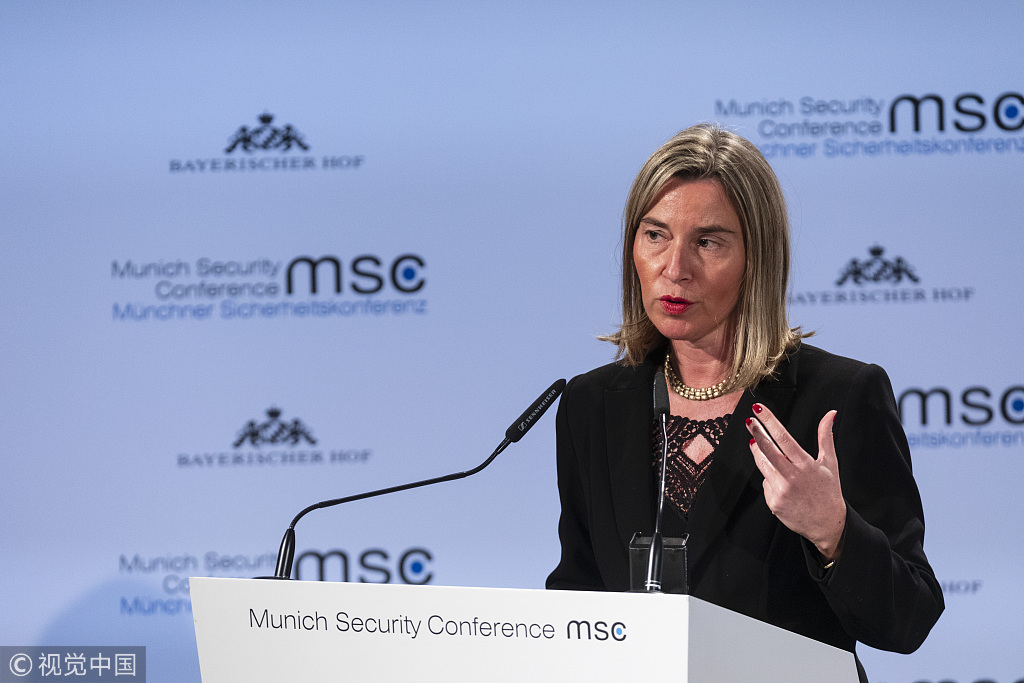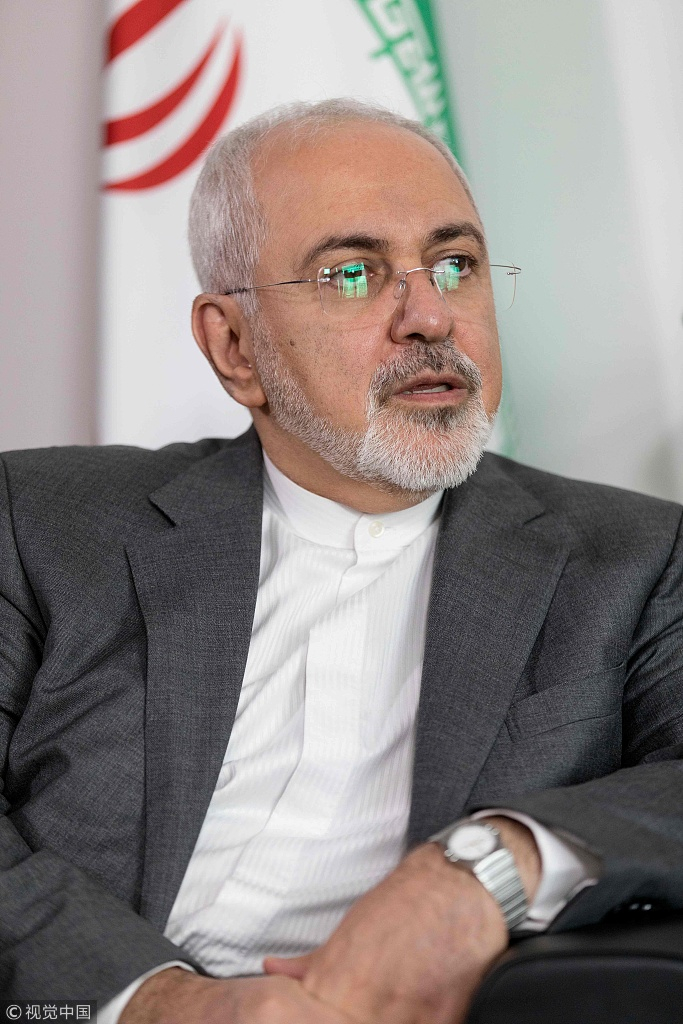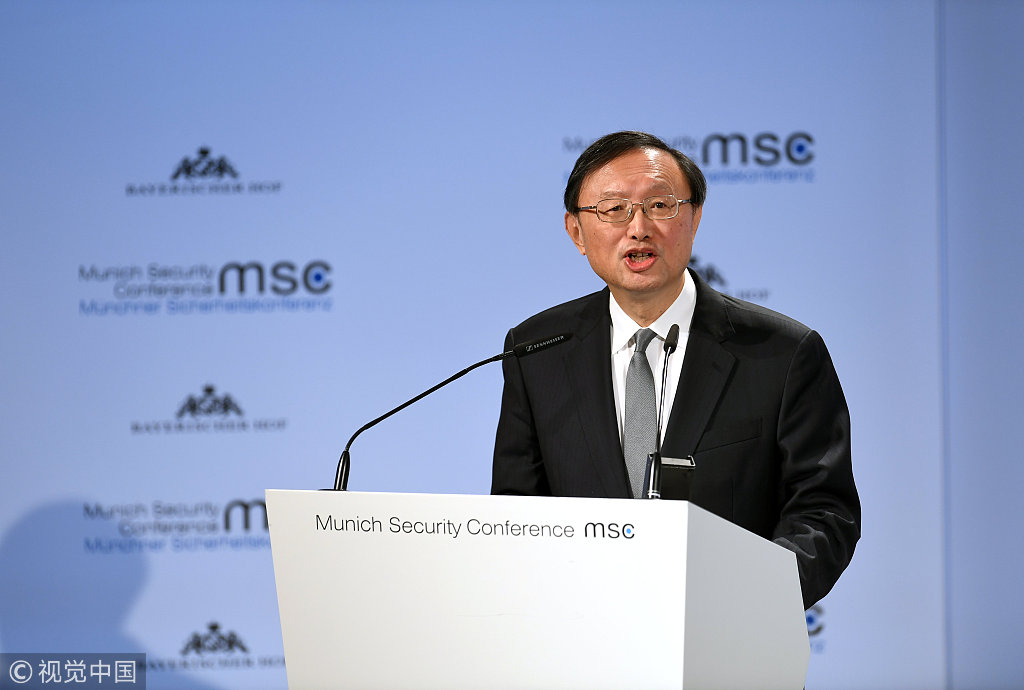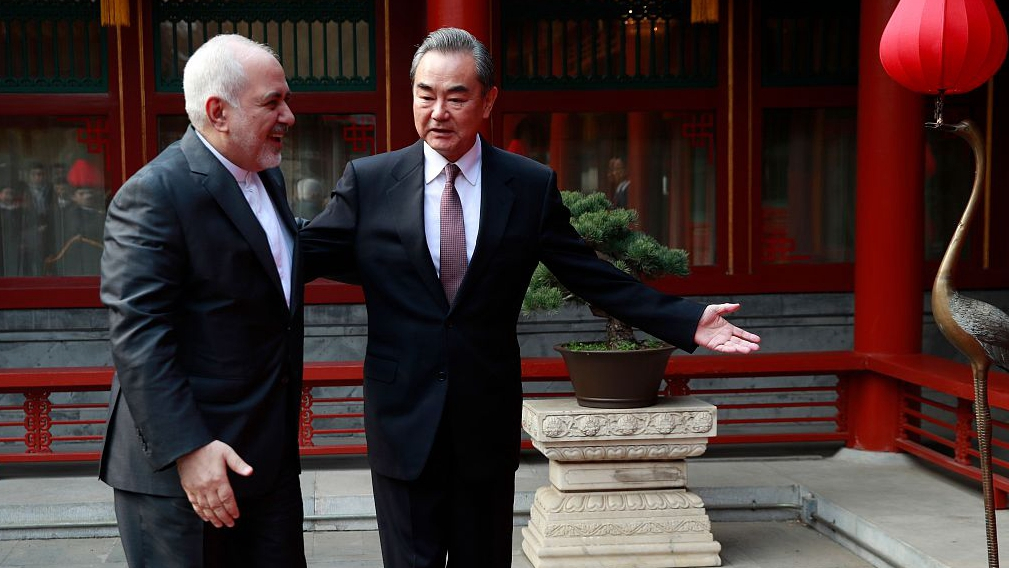Editor's note: Ghanbar Naderi is an Iranian journalist, a current affairs commentator, a documentary filmmaker, and a member of the Writers Guild of Great Britain. The article reflects the author’s opinion, and not necessarily the views of CGTN.
European Foreign Policy Chief Federica Mogherini should be lauded for her courage and constant effort to highlight the international community's ongoing success in preserving the rules-based international order, international treaties and agreements, ways to face down U.S. President Donald Trump and his go-it-alone approach and short-termism through multilateralism and global cooperation.
Addressing this year's Munich Security Conference, Mogherini held tough on the EU's commitment to the 2015 Iran nuclear deal, saying that the 28-nation bloc regards the agreement as an effective guarantor of peace.

Federica Mogherini, foreign policy chief of the European Union (EU), speaks during a panel discussion on the opening day of the Munich Security Conference in Munich, Germany, February 15, 2019. /VCG Photo
Federica Mogherini, foreign policy chief of the European Union (EU), speaks during a panel discussion on the opening day of the Munich Security Conference in Munich, Germany, February 15, 2019. /VCG Photo
“I believe if it was not for the European Union and its member states, starting with France, Germany and the UK, I am sure that the nuclear deal with Iran would have been dead long ago,” she said. “We believe it is fundamental and crucial for our security.”
The EU foreign policy chief's comments were spot-on, but to some extent they ran against the grain of today's truth, as they celebrated only one version of truth.
True, her comments came after U.S. Vice President Mike Pence demanded that the EU follow Washington out of the Iran nuclear agreement. And the blistering Pence speech did little to alter the course of EU's Iran policy. Even German Foreign Minister Heiko Maas also said that Europe would seek to keep the deal alive. But pressed on what more Europe could do as its companies exit Iran under U.S. pressure, he declined to spell out any new tactics – like Mogherini.
Sinking trade
The EU's ability to push back on U.S. unilateral sanctions is limited as many companies are already complying for fear of losing access to the bigger and more lucrative U.S. market.
According to Eurostat, trade between Iran and the 28 member states of the EU went down by 66.02 percent year-on-year to stand at 679.55 million euros in November 2018. Iran's exports during the one-month period amounted to 209.98 million euros, registering a 78.12 percent downfall as imports fell by 54.86 percent to reach 469.56 million euros.

Iranian Foreign Minister Mohammad Javad Zarif meets with European Union foreign policy chief Federica Mogherini concerning Iran's nuclear deal at the EU headquarters in Brussels, May 15, 2018. /VCG Photo
Iranian Foreign Minister Mohammad Javad Zarif meets with European Union foreign policy chief Federica Mogherini concerning Iran's nuclear deal at the EU headquarters in Brussels, May 15, 2018. /VCG Photo
European governments are yet to take full advantage of their capacities to develop trade and banking ties with Iran. Mogherini certainly used her presentation and rhetorical style in Munich to disrupt her American opponents and mobilize international supporters for the deal. She should be lauded for that and she was lauded. But as Eurostat figures show, she shouldn't get away scot-free without any trenchant.
Creating the age of multilateralism
In the meantime, it isn't just the European Union that has created an age in which multilateralism is becoming more of the norm of discourse than its exception. A clear example of this was the presentation from China at the same conference whose entire goal was to reinforce and rally support against the evils of Washington's unilateralism.
The keynote speech by Yang Jiechi, a member of the Political Bureau of the Communist Party of China Central Committee, illustrated the popularity of such policy in Munich. He talked about multilateralism and dialogue – the reasons why the White House is putting Chinese companies on notice too, saying that if they try to do an end-run around U.S. sanctions on Iran, they will be subject to stiff fines and penalties.
Unfazed, Beijing is marching forward with the UN-endorsed plan to preserve the nuclear deal. Here, the choice is not whether to do business with Iran or the United States – as Pence would like to suggest. It is to voice dismay at Trump's geographical setting and colonial mindset deemed hostile to Chinese President Xi Jinping's foreign policy of “lasting peace, universal security and common prosperity,” by “building of a new type of international relations and a community with a shared future for mankind.”

China's Political Bureau member Yang Jiechi speaks during the Munich Security Conference in Munich, Germany, February 16, 2019. /VCG Photo
China's Political Bureau member Yang Jiechi speaks during the Munich Security Conference in Munich, Germany, February 16, 2019. /VCG Photo
Changing the contours of a colonial mindset
The truth is that the European Union is not the only signatory that preserved the nuclear deal. This view by Mogherini in Munich had a distinctly colonial flavor. China, Russia, the United Nations and many other responsible members of the international civil society played key roles in this historic success too. So it makes very little sense to claim that the EU's efforts were the “finished product.”
To change the contours of this colonial mindset and to celebrate the other version of truth, therefore, Iranian Foreign Minister Mohammad Javad Zarif went to Beijing on Tuesday, February 19, leading a delegation that included the country's parliamentary speaker, the ministers of finance and petroleum, and the CEO of the central bank.
During a meeting with Zarif, and amid efforts to preserve the nuclear deal also known as the Joint Comprehensive Plan of Action (JCPOA), China's Foreign Minister Wang Yi said Zarif's passionate defense of his country's interests in the Munich Security Conference has made him "a famous person" in China.
Speaking to reporters, Wang also said, "I would like to take this opportunity to have this in-depth strategic communication with my old friend to deepen the strategic trust between our two countries, and to ensure fresh progress of the bilateral comprehensive and strategic partnership.”
In response, Zarif said, “This is very valuable to Tehran.” We couldn't agree more. As maintained by President Xi Jinping during a meeting with Iranian Parliament Speaker Ali Larijani in Beijing, "No matter how the international and regional situation changes, China's resolve to develop a comprehensive strategic partnership with Iran will remain unchanged."
If this is not holding tough on China's commitment to the Iran deal and playing a constructive role in maintaining regional peace and stability, we don't know what is.
(If you want to contribute and have specific expertise, please contact us at opinions@cgtn.com)





